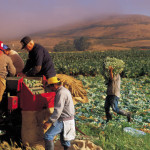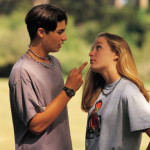Today as I absorbed my morning caffeine, I read my friend Rae Ellen Lee’s excellent book Cheating the Hog, which is the story of a woman working in a sawmill in a remote area. As I read scenes describing the hard physical labor, I was reminded of when I worked at a tree farm during graduate school in Oklahoma. The farm was owned by the US Forest Service and, forest and wilderness lover that I am, I thought it was cool to be able to say I worked for the USFS.
 The work was definitely not cool, though. The farm grew trees to plant on public lands and give to farmers for windbreaks and shade trees.We labored in treeless Oklahoma farm fields instead of in the wild. The job had previously been done by convicts, which should have been a hint on multiple levels.
The work was definitely not cool, though. The farm grew trees to plant on public lands and give to farmers for windbreaks and shade trees.We labored in treeless Oklahoma farm fields instead of in the wild. The job had previously been done by convicts, which should have been a hint on multiple levels.
Our job as workers was to weed the tiny seedlings as they grew, and then harvest and bundle them when they were big enough to ship. The weather seemed to always be freezing or blistering hot, and the wind always blew, so by the end of a shift in the fields, we looked like a scene from the Grapes of Wrath, struggling to stand erect again and plastered in red dirt. Stuck out there for hours on end, though, the field crews bonded through stories and songs.
When we harvested trees, some workers walked behind the shaker tractor attachment, tossing the saplings up onto the conveyer belt, which bounced violently to knock off the soil clinging to roots. Those of us along the sides of the belt pulled the trees into the same orientation, roots to roots. When it rained, we were covered in mud instead of dust. The only indoor jobs were bundling saplings, which involved counting and wrapping them. Not too bad, except when we handled what were called “rose trees,” which had long thorns sharp and strong enough to punch through leather gloves. I could understand how those trees would make great windbreaks around pastures; no self-respecting animal or human would try to break through that barrier.
At the time, I was peeved that I needed to work and that this was the only type of work I could find that fit around my class schedule. But now I’m grateful for the experience, and I know it made me a better writer. I’ve had a small taste of what the work is like for the pickers I see stooped over the strawberry fields around my town. I know how their backs hurt and their hands are cut up. I also know that they share stories, and I hope they share songs and friendships, too.
I try to pick up nuggets of wisdom whenever I recognize one, and at the tree farm I gained a jewel as one co-worker told me, “Whenever I get really angry, I ask myself: Will I care about this a year from now? If the answer is Yes, then I do something about it; if the answer is No, I let it go.” It’s a great principle to live by. If I could only remember her name, I’d track that worker down and say Thank You.
All these reflections have me wondering what writers who grew up with more privileged lives have to write about. Seems to me like they’d be missing out on how half the world lives and thinks. But probably they’re the ones who write about shopping and makeup and mean girls in private schools, and there’s a place for all that, too. Or maybe they are the wonderful fantasy writers, or maybe they simply learn how other people live from wonderful books like Rae Ellen Lee’s.
 Cheating the Hog has a lot of scenes describing the insidious and often dangerous sexism practiced in the sawmill. I can identify with that, too, although most of my experiences with predatory men came in two white-collar jobs: a government office and a geological laboratory. My experiences there make for richer writing, too, and also make me a better private investigator. But that’s a subject for another blog post.
Cheating the Hog has a lot of scenes describing the insidious and often dangerous sexism practiced in the sawmill. I can identify with that, too, although most of my experiences with predatory men came in two white-collar jobs: a government office and a geological laboratory. My experiences there make for richer writing, too, and also make me a better private investigator. But that’s a subject for another blog post.
When I was 13, I worked in strawberry fields on Whidbey Island. I’m probably showing my age, but I doubt there was a rule then about child labor, as ALL of us were younger than 15! But we picked sitting on our butts for the most part and scooting through the rows. I probably ate twice or three times as many berries as I picked in those dratted flats–we got paid pennies for each flat (literally!) When I came home (a friend and fellow picker’s mom usually drove us there and back again), I was covered in dirt and dust and after cleaning up in the tub, would watch as the accumulated mud (too thick to be called simply dirty water) eventually went down the drain. You’re right, Pam. Such experiences can lend credibility to what we write when we recall those situations in which we had direct experience.